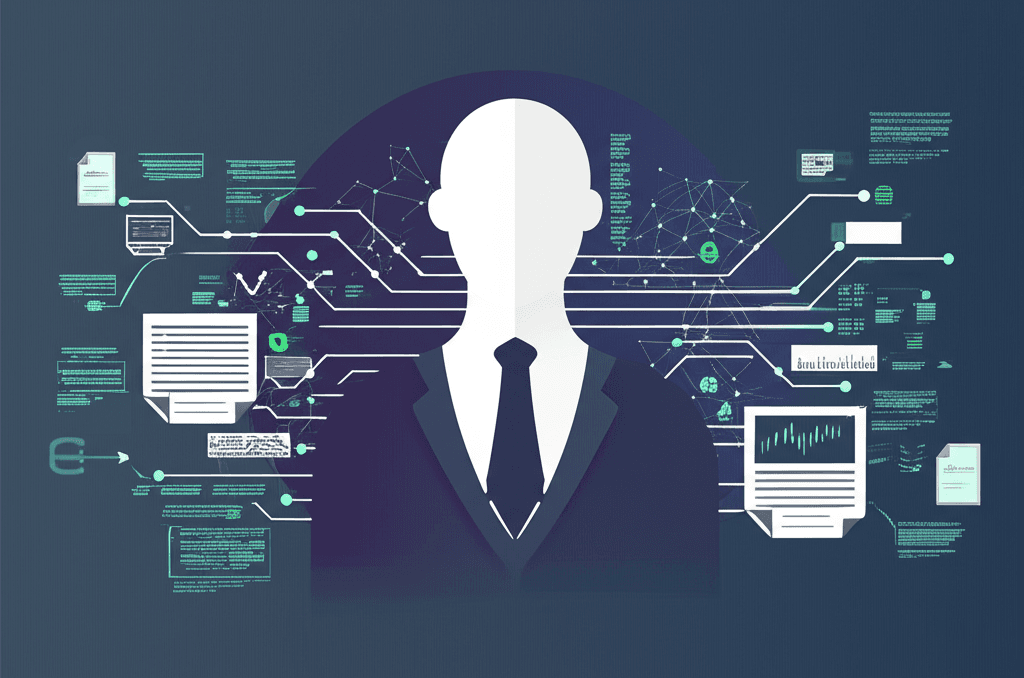Agentic AI Reinvents Law: Autonomous Systems Become Active Legal Partners
How autonomous AI acts as an active partner, automating legal tasks, enhancing research, and empowering lawyers for strategic focus.
June 30, 2025

The legal profession, traditionally reliant on manual research and meticulous human oversight, is on the cusp of a significant transformation driven by agentic artificial intelligence. Unlike earlier AI tools that responded to specific prompts, agentic AI systems are defined by their ability to autonomously pursue goals, reason strategically, and execute complex, multi-step tasks.[1] This evolution marks a shift from AI as a passive assistant to an active partner, capable of managing entire workflows and even collaborating with other AI agents to support legal professionals.[1][2] The integration of these intelligent agents into law firms and legal departments promises to revolutionize long-standing processes, from document review and legal research to complex case management, ultimately reshaping the delivery of legal services.[3][4]
One of the most immediate and profound impacts of agentic AI is in the automation of routine and time-consuming tasks.[5][6] Legal professionals often dedicate substantial hours to administrative duties, document review, and initial drafting, tasks that, while necessary, detract from higher-value strategic work.[6][7] AI agents can now automate these processes with remarkable efficiency.[8][9] For instance, in contract management, AI can draft, review, analyze, and track agreements, identifying critical clauses, flagging risks, and ensuring compliance with regulatory standards.[10][11] Some firms have reported using agentic AI-assisted tools for contract review that achieve up to 92% accuracy.[3] In one case, a complaint response system powered by AI reduced associate time on a task from 16 hours to just a few minutes.[12] Similarly, J.P. Morgan Chase implemented an AI program called COIN that reviewed in seconds a volume of legal documents that would have taken human lawyers 360,000 hours annually.[13] By handling these repetitive responsibilities, agentic AI frees up lawyers to concentrate on strategic thinking, client interaction, and complex problem-solving.[6][4][14]
The realm of legal research and due diligence is also being fundamentally altered by this technology.[15] AI-powered tools can sift through immense volumes of case law, statutes, and legal documents in a fraction of the time required for manual searches, presenting curated and contextually relevant information.[4][16][7] AI agents can not only locate pertinent precedents but also analyze them to anticipate potential implications for a specific case.[4] In due diligence for mergers and acquisitions, AI can scrutinize vast datasets to verify corporate structures, finances, and compliance, helping organizations avoid legal and reputational risks.[17] This capability for rapid, comprehensive analysis extends to litigation strategy, where AI tools can assess trends in past cases and even predict the potential rulings of specific judges.[15] This empowers legal teams to make more informed, data-driven decisions, strengthening their case strategies and providing better counsel to their clients.[8][18]
Furthermore, agentic AI is poised to enhance the overall operational efficiency and client service of law firms. These systems can manage workflows by automating task delegation, tracking deadlines, and even handling client intake and communication through intelligent chatbots.[19][20] By integrating with a firm's case management and CRM systems, AI agents can provide instant access to case details, schedule appointments, and offer personalized client support.[20] This level of automation not only improves response times but also ensures consistency and accuracy in communication and administrative tasks.[5] According to one report, AI could save lawyers an average of four hours per week, which could translate into significant new billable time annually.[5] As these technologies become more sophisticated, they are expected to manage entire projects, with different agents handling research, drafting, and client communications in a coordinated ecosystem.[21] This move towards end-to-end workflow automation promises to reduce errors, streamline operations, and allow legal professionals to deliver higher quality service.[22][23]
In conclusion, the rise of agentic AI represents a pivotal moment for the legal industry. While not a replacement for human lawyers, these autonomous systems are powerful tools that augment legal professionals' capabilities, allowing them to offload repetitive work and focus on the core human elements of law: strategy, advocacy, and client relationships.[2][21] The dramatic gains in efficiency seen in tasks like document review and legal research are just the beginning.[12][13] As firms increasingly adopt this technology, from 30% of firms using AI in early 2024, a number that has nearly tripled in a year, the pressure to integrate these tools will grow.[24] The future of legal practice will likely involve a collaborative model where human lawyers and AI agents work together, with AI handling the process-driven tasks and lawyers providing the essential judgment, ethical oversight, and strategic direction.[3][2] The firms that successfully navigate this transition by embracing agentic AI will not only gain a competitive edge but will also be better equipped to meet the evolving demands of their clients in an increasingly complex world.[22]
Sources
[1]
[8]
[9]
[11]
[12]
[13]
[14]
[15]
[16]
[17]
[18]
[19]
[20]
[21]
[22]
[23]
[24]